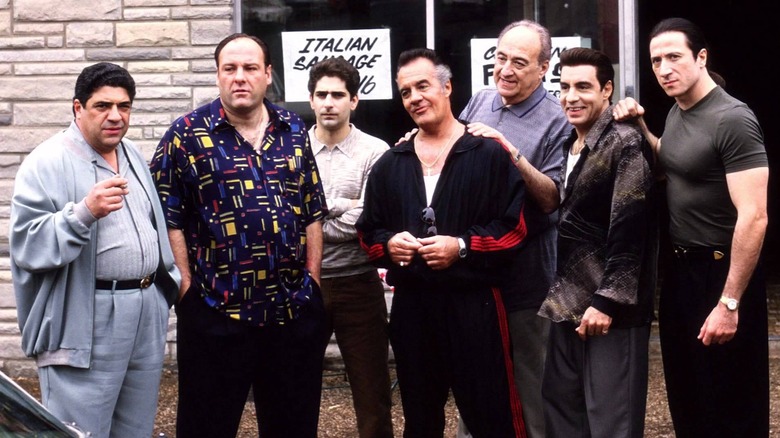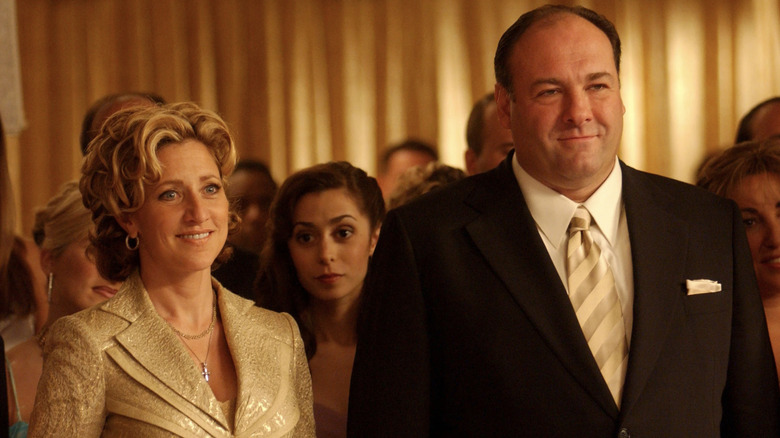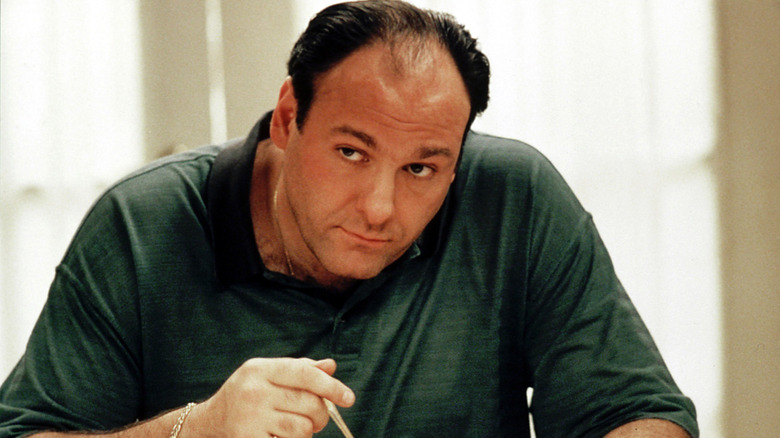How A Pay Dispute Almost Shut Down The Sopranos
The drama of one of HBO's most acclaimed series extended well beyond the confines of its slot on the schedule. Before filming was set to commence on the fifth season of "The Sopranos," the cast felt that they needed a contract re-negotiation, namely one that would include a substantial pay raise. When considering how much money "The Sopranos" was making HBO (projected to be around $100 million in 2003), it's no wonder that the cast felt they deserved compensation rivaling that of popular network stars of shows like "Frasier" or "Everybody Loves Raymond."
One cast member in particular went so far as to take HBO to court: James Gandolfini, the New Jersey icon who brought Tony Soprano to life. In a surprising turn of events, HBO threw a lawsuit right back at Gandolfini, beginning a fiery battle that threatened to shut the show down indefinitely. Despite the tension (and incessant media attention) between Gandolfini and HBO, there was utmost solidarity among the cast — culminating in a generous gesture by Gandolfini that continues to be remembered by principal "Sopranos" cast members to this day.
What Started This Stalemate?
Essentially, it began as a grumbling. Cast members began to feel that their pay was not accurately mirroring the profit being made at HBO off of "The Sopranos," which at this point had concluded filming its fourth season. When the prospect of re-negotiation appeared out of the question, the core cast resolved to orchestrate an on-set protest. Edie Falco, who embodies the uncomfortable Carmela, gave a pithy description of the ordeal in Vanity Fair's 2012 oral history of "The Sopranos":
"There was a period of mutiny within the cast members, who thought we should be getting more money, and this was a very complicated issue, because I know HBO was making a lot of money. The actors were like, 'Yeah, we need to renegotiate our contracts. We're not getting enough.' There was like a sit-in, like the shutdown of the set. It was like "Occupy Vesuvio." And I thought, Are you f****ing kidding me? I worked at restaurants for 20 years, and this thing comes along and I'm going to complain about not getting enough money?"
Yet this dispute evolved on an entirely different level when Gandolfini felt he needed to play hard ball with the network in order for his demands to be taken seriously. At the time, he was making about $400,000 per episode, and sought to increase this number to at least $1 million. Instead of granting Gandolfini's request, HBO countered with $800,000 — causing Gandolfini to file a Superior Court complaint claiming that the network breached his contract.
Though the figure of $1 million per episode seems outlandish, it was certainly standard for the time. Comparatively, Kelsey Grammar was making around $1.6 million per episode of "Frasier," while Ray Romano was earning roughly $1.7 million per episode on "Everybody Loves Raymond." When looking at the issue with this context, it's clear that Gandolfini was merely fighting for fair compensation from a network that made $800 million in revenue that year.
Bada Bing, Bada Bankroll: James Gandolfini Puts His Money Where His Mouth Is
As we all know, "The Sopranos" did not end over this issue. In the end, Gandolfini took the $800,000 figure, still making approximately $10 million per season. As the head honcho on the show, he certainly ended up making more than his co-stars ... but he was hell-bent on making his fight for fair compensation pay off for the rest of his on-screen famiglia as well.
Steven Schirippa, known as Bobby "Bacala" Baccalieri on the show, recounts a gesture made by Gandolfini before filming of season 5 was set to finally commence:
After Season Four [when Gandolfini and HBO had a pay dispute and filming was delayed], Jim called all the regulars into his trailer and gave us $33,333 each, every single one of us. Now, there were a lot of big actors—Kelsey Grammer, Ray Romano—and they're all nice guys, I'm sure, but nobody gave their cast members that kind of money. That's like buying everybody an S.U.V. He said, "Thanks for sticking by me."
Though he arguably got less than what he sought out for, it's clear that this spat was never just about the money for Gandolfini. He simply wanted for himself and his fellow cast members to be recognized not just critically for the impressive work they were achieving through creator David Chase's TV opus, but financially, as well.


